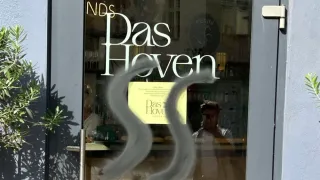
Jul 30
Julia Garner Confirms Madonna Biopic Still in the Works, Reassuring Fans Amid Delays
READ TIME: 2 MIN.
Julia Garner, the acclaimed actor known for her roles in "Ozark" and more recently "Fantastic Four: First Steps," has officially updated fans on the status of the Madonna biopic, stating that the project is "supposed to still happen" despite a series of production setbacks and rumors of cancellation . Garner made this announcement during a recent appearance on the SmartLess podcast hosted by Sean Hayes, Will Arnett, and Jason Bateman, offering a fresh wave of optimism for a film that has been in limbo since its initial announcement .
First announced in 2020, the Madonna biopic quickly drew attention for its ambitious vision: Madonna herself was set to direct, produce, and co-write the script, with celebrated screenwriter Diablo Cody initially attached to the project . However, the film's development was far from smooth. Cody exited the project in 2021 to pursue other commitments, leading to significant delays and uncertainty about the project’s future . Despite these hurdles, industry insiders confirmed in mid-2022 that Julia Garner was the top choice to portray the pop icon, underscoring her rising stardom and the immense responsibility of bringing Madonna’s legacy to life .
Rumors of cancellation intensified in the past year, especially as competing projects—including a Netflix series exploring similar themes—were rumored to be in development . Yet Julia Garner’s recent comments have clarified that the biopic is not dead, and work is still ongoing to bring Madonna’s story to the big screen .
The Madonna biopic holds particular resonance for LGBTQ+ audiences, given Madonna’s longstanding status as a queer icon and outspoken ally. Throughout her career, Madonna has championed LGBTQ+ rights, used her platform to challenge homophobia and transphobia, and incorporated queer themes and performers in her work . Her influence extends beyond music, shaping conversations about gender, sexuality, and the power of unapologetic self-expression. For many LGBTQ+ individuals, Madonna’s story is emblematic of resilience and the transformative power of visibility.
Julia Garner’s own advocacy and commitment to inclusive representation further strengthens the importance of this project. LGBTQ+ advocates have praised the casting choice, noting that Garner’s nuanced portrayals and public support for queer rights align with Madonna’s enduring legacy .
While no official release date has been confirmed, Garner’s update signals active development and continued dedication from the creative team . The film remains highly anticipated not only for its star power but also for its potential to explore Madonna’s complex, decades-spanning relationship with the LGBTQ+ community. Fans and advocates are watching closely, hoping the final product will reflect the authenticity, boldness, and unapologetic spirit that Madonna embodies.
As production continues, the biopic is poised to be a landmark moment in LGBTQ+ cinema, amplifying queer stories and honoring one of the community’s most influential allies. For now, as Julia Garner herself says, Madonna’s story is “supposed to still happen”—and for many, that’s a reason to hope.






